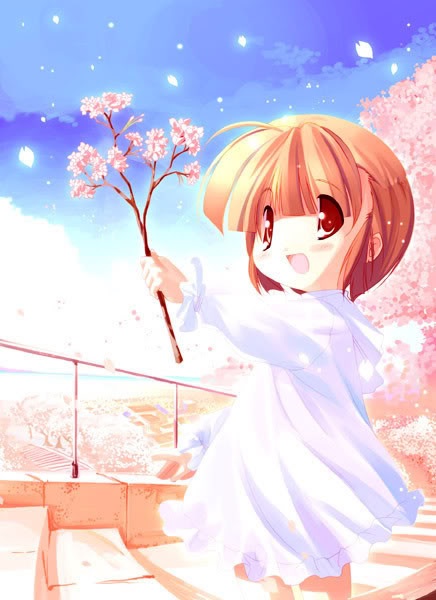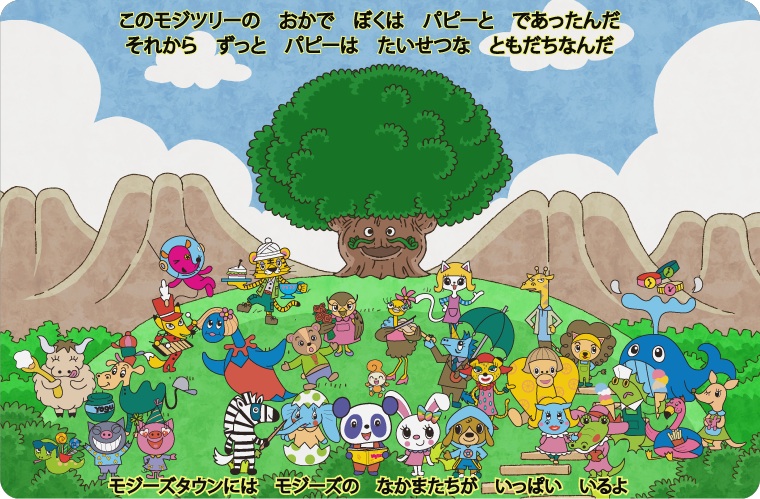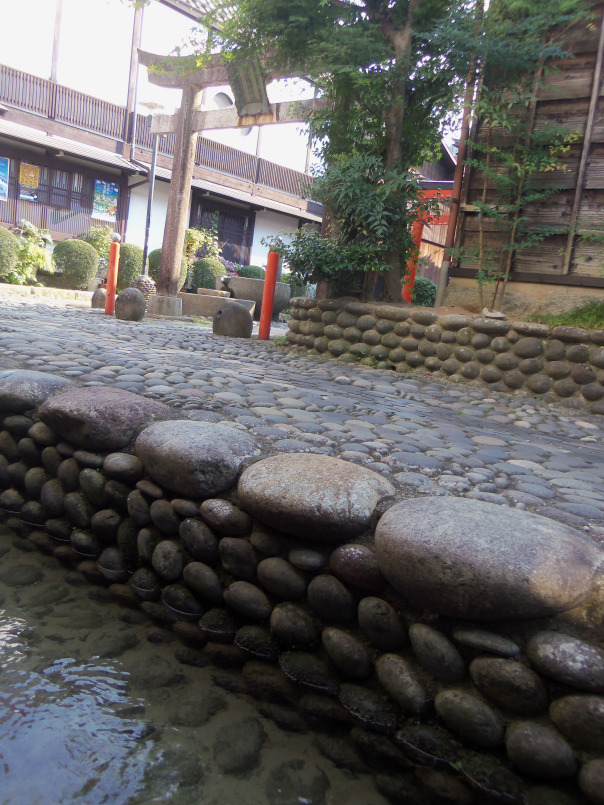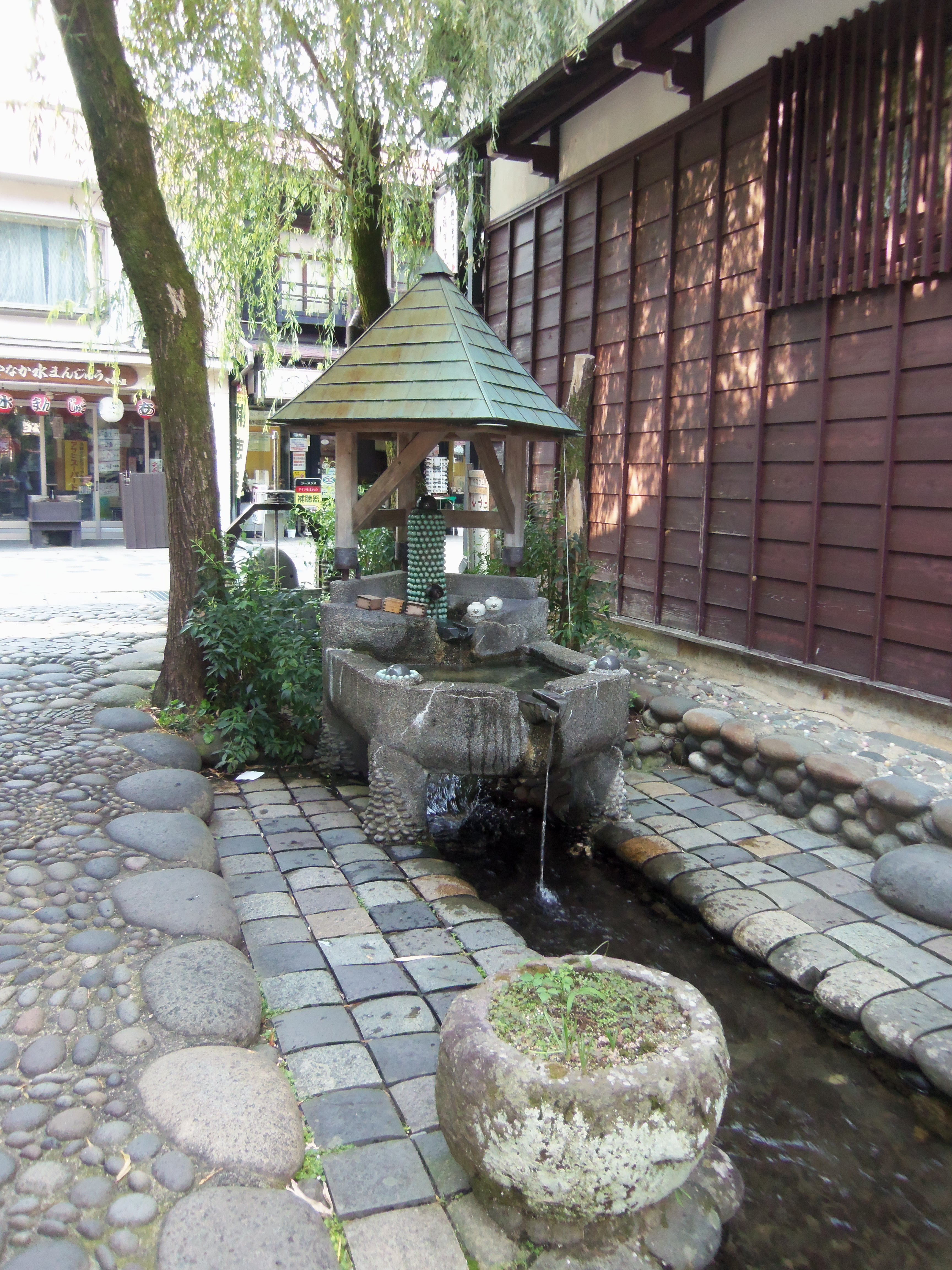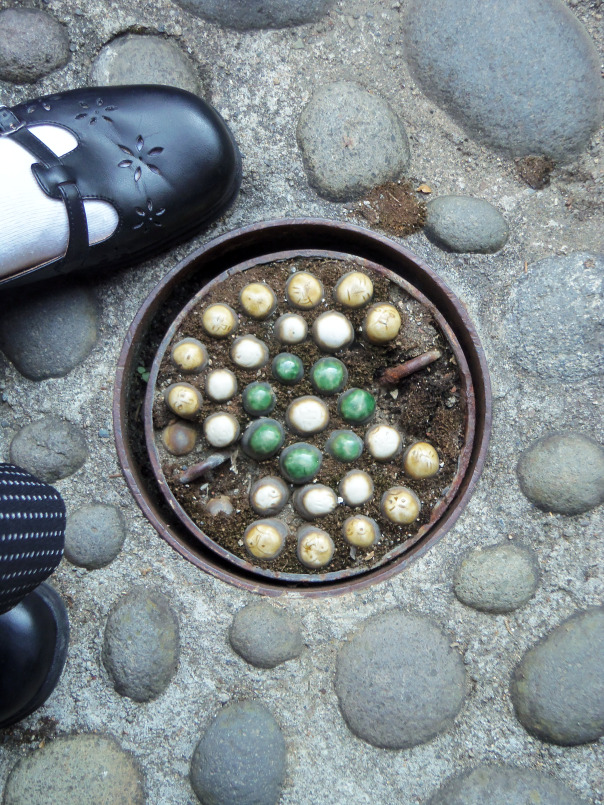
There is very little hiragana reading practice available on the Web so we thought we would combine this with our love of kawaisa to bring you something really cute in full Japanese and spaced hiragana.
First we have the hiragana version, then the full kana/kanji version and finally a version that includes both, plus vocabulary and translation for each paragraph.
Enjoy your hiragana reading practice and feel free to ask questions or comment!
このお話を楽しんでください。
この おはなし を たのしんで ください。
Please enjoy this story.
KIKI COMES TO TEA
Kinoketta is a walking, talking mushroom who lives in a house-tree. Flifli is her butterfly friend. They have many adventures in the forest.
Hiragana version
ある ひ の こと、ふりふり は きのけった の き うち に やってきました。 きのけった は おおそうじ を しました。
なに を しています か?」と、ふりるり ききました。
きのけった:「きょう は、この もり に すんで いた ともだち が きます」
ふりふり:「どんな ともだち です か?」
きのけった:「りす の きき です。どんぐり だけ を たべます。」
ふりふり:「そうです か! わたし は どんぐり が たくさん ある ところ を しっています。どんぐり を もってきましょう か?」
きのけった:「なんて しんせつ な ちょうちょう でしょう!どうも ありがとう ございます。」
ふりふり は でかけました。 そして、しばらくて ふりふりは もとってきました。どんぐり を たきさん もって いました。
きのけった は いす を みがいて いました。
ふりふり:「その いす を みた の は はじめて です。
きのけった:「ききちゃん が いつも すわって いた いす です。よろこぶ と おもいます。」
その とき、げんかん の べる が なりました。きのけった は と を あけました。ふたり の まえ に、ちいさくて ぴんく いる の りす が たって いました。
きき:「きのけったちゃん!ひさしぶり です ね!」
きのけった:「ききちゃん と あえて うれしい です わ!こちら は ともだち の ふりふり です。 まえにち、あそび に やってきました。
さんびき は おちゃ を のみ、そして、ふりふり は さら を もってきました。さら に は おかし と どんぐり が のって いました。
きき は おかし を とりました
きのけった:「どうして おかし を とった の でしょう か?どんぐり は もう すき じゃない の です か?」
きき:「どんぐり が だいすき です。でも おいしい どんぐり を とる の は はずかしい です。みなさん も どんぐり が いちばん すき だ と おもいます。」
ふりふり:「いえいえ、きのけった と わたし は おかし が だいすき です! どんぐり は ききちゃん の ため だけ もってきました。
ききは「とても やさしい ちょうちょう ですよ!」と 言って、どんぐり を たくさん たべました。
___
Kana and kanji version
ある日のこと、フリフリはキノケッタの木の家にやって来ました。
キノケッタは大そうじをしていました。
「何をしていますか?」と、フリフリは聞きました。
キノケッタ:「今日は、この森に住んでいた友達が来ます。」
フリフリ:「どんな 友達ですか?」
キノケッタ:「リスのキキです。キキは、ドングリだけを食べます。」
フリフリ:「そうですか!私はドングリがたくさんある所を知っています。ドングリを持って来ましょうか?」
キノケッタ:「なんて親切なチョウチョウでしょう!どうもありがとうございます。」
フリフリは出かけていきました。そして、しばらくしてフリフリは戻ってきました。ドングリをたくさん持っていました。
キノケッタは椅子を磨いていました。
フリフリ:「その椅子を見たのは初めてです。」
キノケッタ:「キキちゃんがいつも座っていた椅子です。喜ぶと思います。」
その時、玄関のベルが鳴りました。キノケッタは戸を開けました。二人の前に、小さくてピンクいろのリスが立っていました。
キキ:「キノケッタちゃん!久しぶりですね!」
キノケッタ:「キキちゃんと会えてうれしいですわ!こちらは友達のフリフリです。毎日、遊びにやってきます。」
三匹はお茶を飲み、そして、フリフリは皿を持って来ました。皿には、お菓子とドングリがのっていました。
キキはお菓子を取りました。
キノケッタ:「どうしてお菓子をとったのでしょうか?ドングリはもう好きじゃないのですか?」
キキ:「ドングリが大好きです。でもおいしいドングリを取るのは恥ずかしいです。皆さんもドングリが一番好きだと思います。」
フリフリ:「いえいえ、キノケッタと私はお菓子が大好きです!ドングリはキキちゃんのためだけに持って来ました。」
キキは「とても優しいチョウチョウですよ!」と言って、ドングリをたくさん食べました。
Vocabulary and translation version
ある日のこと、フリフリはキノケッタの木の家にやって来ました。キノケッタは大そうっじをしました。
ある ひ の こと、ふりふり は きのけった の き うち に やってきました。 きのけった は おおそうじ を しました。
Vocabulary:
Aru hi no koto: Traditional phrase, meaning “one day”
Yattekimasu: To come around, turn up
Oosouji: Major clean-up (sometimes Spring cleaning)
Translation:
One day, Flifli came along to Kinoketta’s house- tree. Kinoketta was doing a big clean-up.
___
「何をしていますか?」と、フリフリは聞きました。
なに を しています か?」と、ふりるり ききました。
Vocabulary:
To: quotation particle.
Kiku: hear, listen, ask enquire.
Translation:
“What are you doing?” asked Flifli.
___
キノケッタ:「今日は、この森に住んでいた友達が来ます。」
きのけった:「きょう は、この もり に すんで いた ともだち が きます」
Grammar:
Kono mori ni sunde ita (in this forest that lived) is a phrase used as an adjective before the noun tomodachi (friend). This is a very common Japanese construction.
Translation:
A friend who used to live in this forest is coming here today.
___
フリフリ:「どんな 友達ですか?」
キノケッタ:「リスのキキです。キキは、ドングリだけを食べます。」
ふりふり:「どんな ともだち です か?」
きのけった:「りす の きき です。どんぐり だけ を たべます。」
Vocabulary:
Donna: What kind of?
Risu: Squirrel
Donguri: Acorn
Dake: Only
Translation:
Flifli: “What kind of friend is she?” (tell me about your friend).
Kinoketta: “She is Kiki the squirrel. She eats nothing but acorns.”
___
フリフリ:「そうですか!私はドングリがたくさんある所を知っています。ドングリを持って来ましょうか?」
キノケッタ:「なんて親切なチョウチョウでしょう!どうもありがとうございます。」
ふりふり:「そうです か! わたし は どんぐり が たくさん ある ところ を しっています。どんぐり を もってきましょう か?」
きのけった:「なんて しんせつ な ちょうちょう でしょう!どうも ありがとう ございます。」
Vocabulary:
Mottekuru: Motsu (have or carry) plus kuru (come) = bring.
Nante: What a
Shinsetsu: kind (na adjective)
Chouchou: Butterfly
[Note the adjectival phrase again “lots-of-acorns-exist place”]
Translation:
Flifli: “Is that so? I know a place where there are lots of acorns. Shall I go fetch some acorns?”
Kinoketta: “What a kind butterfly! Thank you very much.”
フリフリは出かけていきました。そして、しばらくしてフリフリは戻ってきました。ドングリをたくさん持っていました。
ふりふり は でかけました。 そして、じばらくて ふりふりは もとってきました。どんぐり を たきさん もって いました。
Vocabulary:
Dekakeru: Set out, depart
Shibarakute: Shortly, after a short time.
Modoru: Return
Translation:
Flifli set out. After a short time she came back. She was carrying a lot of acorns.
___
キノケッタは椅子を磨いていました。
フリフリ:「その椅子を見たのは初めてです。」
キノケッタ:「キキちゃんがいつも座っていた椅子です。喜ぶと思います。」
きのけった は いす を みがいて いました。
ふりふり:「その いす を みた の は はじめて です。
きのけった:「ききちゃん が いつも すわって いた いす です。よろこぶ と おもいます。」
Vocabulary:
Migaku: To polish
Hajimete: For the first time
Yorokobu: to be pleased, delighted, glad.
Translation:
Kinoketta was polishing a chair.
Flifli: “This is the first time I have seen that chair.” [I haven’t seen that chair before].
Kinoketta: “Kiki always used to sit in this chair. She will be pleased [it will make her happy], I think.”
___
その時、玄関のベルが鳴りました。キノケッタは戸を開けました。二人の前に、小さくてピンクいろのリスが立っていました。
その とき、げんかん の べる が なりました。きのけった は と を あけました。ふたり の まえ に、ちいさくて ぴんく いる の りす が たって いました。
Vocabulary:
Genkan: The pre-entrance of a Japanese house, where shoes are removed and left.
Naru: To ring, to sound.
To: (Japanese style) door.
Translation:
Just then the genkan-bell rang. Kinoketta opened the door. Before the two [friends] stood a small pink squirrel.
___
キキ:「キノケッタちゃん!久しぶりですね!」
キノケッタ:「キキちゃんと会えてうれしいですわ!こちらは友達のフリフリです。毎日、遊びにやってきます。」
きき:「きのけったちゃん!ひさしぶり です ね!」
きのけった:「ききちゃん と あえて うれしい です わ!こちら は ともだち の ふりふり です。 まえにち、あそび に やってきました。
Vocabulary:
Hisashiburi: It’s been a long time.
Ureshii: Happy
Wa: Feminine emphatic sentence ender.
Kochira: This side (i.e. this person)
Asobu: Play, spend time pleasantly
Translation:
Kiki: “Kinoketta-chan! It’s been a long time, hasn’t it!”
Kinoketta: “Meeting you [again] makes me very happy, Kiki-chan. This is Flifli. She comes around to play every day.”
___
三匹はお茶を飲み、そして、フリフリは皿を持って来ました。皿には、お菓子とドングリがのっていました。
キキはお菓子を取りました。
さんびき は おちゃ を のみ、そして、ふりふり は さら を もってきました。さら に は おかし と どんぐり が のって いました。
きき は おかし を とりました。
Vocabulary:
Sanbiki: San = 3, hiki/biki is the counter for small animals.
Sara: Plate, dish
Okashi: sweets, cakes
Noru: to be placed on
Translation:
The three [friends] drank tea, then Flifli brought a plate. On the plate were cakes and acorns.
Kiki took a cake.
___
キノケッタ:「どうしてお菓子をとったのでしょうか?ドングリはもう好きじゃないのですか?」
キキ:「ドングリが大好きです。でもおいしいドングリを取るのは恥ずかしいです。皆さんもドングリが一番好きだと思います。」
きのけった:「どうして おかし を とった の でしょう か?どんぐり は もう すき じゃない の です か?」
きき:「どんぐり が だいすき です。でも おいしい どんぐり を とる の は はずかしい です。みなさIん も どんぐり が いちばん すき だ と おもいます。」
Vocabulary:
Doushite: Why
Hazukashii, embarrassed, shy, ashamed
Translation:
Kinoketta: “Why did you take a cake? Is it because you don’t like acorns any more?”
Kiki: “I love acorns. But I am embarrassed to take a delicious acorn. Everyone likes acorns best, I think.”
___
フリフリ:「いえいえ、キノケッタと私はお菓子が大好きです!ドングリはキキちゃんのためだけに持って来ました。」
キキは「とても優しいチョウチョウですよ!」と言って、ドングリをたくさん食べました。
ふりふり:「いえいえ、きのけった と わたし は おかし が だいすき です! どんぐり は ききちゃん の ため だけ もってきました。
ききは「とても やさしい ちょうちょう ですよ!」と 言って、どんぐり を たくさん たべました。
Vocabulary:
Ieie: no, not at all
Tame: sake, purpose, benefit
Yasashii: gentle, kind
Translation:
Flifli: “No, not at all, Kinokette and I love cakes. I brought the acorns just for you, Kiki-chan.”
“You are a very kind butterfly!” said Kiki, and ate lots of acorns.
 anrio Puro Land is the world capital of kawaii, and you can get super-cheap discount tickets if you know where to look. But are they a good buy?
anrio Puro Land is the world capital of kawaii, and you can get super-cheap discount tickets if you know where to look. But are they a good buy?
